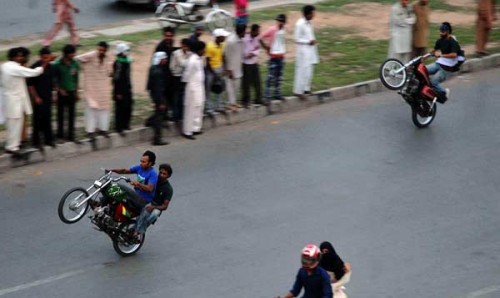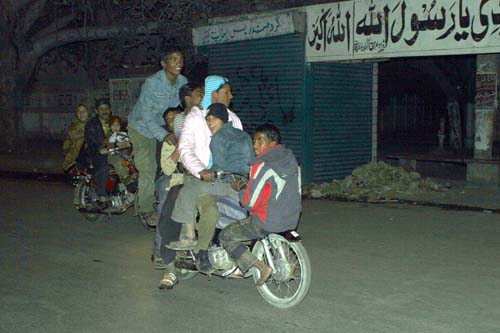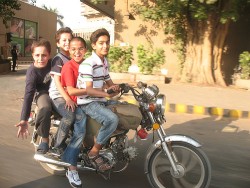اقوام متحدہ کا دس سالہ روڈ سیفٹی پروگرام اور پاکستان کی حالت زار
25 دسمبر 2015 کی دوپہر میں کراچی کی ایک مصروف سڑک یونیورسٹی روڈ سے گز ر رہا تھا کہ اچانک 8، 10 موٹر سائیکل سوار سامنے کی طرف سے آنے لگے۔ ایک مصروف سڑک پر متضاد سمت میں سفر کرنا کوئی آسان بات نہیں لہٰذا میں نے بھی اسے ان بائیک سواروں کے شوق سے تعبیر نہیں کیا۔ بلکہ یہ سمجھا کہ سڑک کی دوسری جانب کسی سیاسی جماعت کی ریلی ہوگی جس کی وجہ سے یہ بےچارے موٹر سائیکل والے غلط رخ پر سفر کرنے پر مجبور ہوگئے۔
تقریباً نصف کلومیٹر مزید سفر کرنے کے بعد ایک بار پھر موٹر سائیکل سواروں کا قافلہ نمودار ہوا اور یہ بھی مخالف سمت سے آ رہے تھے۔ ایک بات جو میں نے منفرد محسوس کی وہ یہ کہ تمام موٹر سائیکل سوار سرخ رنگ کی شرٹ پہنے ہوئے تھے جن کی پشت پر پاکستان کا سبز ہلالی پرچم چھپا ہوا تھا۔ میں اس عجیب و غریب صورتحال کو سمجھنے کی کوشش کر ہی رہا تھا کہ تھوڑے فاصلے پر موٹر سائیکل بنانے والے ایک معروف ادارے کا پروگرام نظر آیا۔ اس پروگرام کی وجہ سے روڈ پر ٹریفک کا بہاؤ شدید متاثر تھا اور نیپا کی طرف جانے والے موٹر سائیکل سوار مخالف سمت میں موٹر سائیکلیں دوڑا رہے تھے۔ گوکہ تین، چار سو میٹر فاصلے پر یو-ٹرن موجود تھا لیکن جلد بازی کا شکار ان موٹر سائیکل سواروں کے پاس 3 منٹ فاصلے طے کرنے کا وقت ہی کہاں تھا۔
یہ بھی پڑھیں: ایٹلس ہونڈا 100 ملین ڈالر سرمایہ کاری؛ کیا جدید بائیک کا خواب پورا ہوگا؟
قابل تعریف اقدام مگر نامناسب انتظام
اگر سچ پوچھیں تو کراچی میں رہنے والے کسی بھی شخص کے لیے یک طرفہ سڑک پر مخالف سمت سے موٹر سائیکل، گاڑیوں، بسوں حتی کہ بڑے ٹرک کا آجانا بھی کوئی حیرانی کی بات نہیں رہی۔ قابل افسوس بات یہ ہے کہ مذکورہ واقعے میں شریک مخالف سمت سے آنے والے بائیک سوار نجی ادارے کے پروگرام میں شرکت کے بعد آ رہے تھے جس کا موضوع باحفاظت سفر تھا۔ مارکیٹنگ کے شعبے سے وابستہ ہونے کی حیثیت سے اس واقعے کے بعد مجھے یہ کہنے میں کوئی عار نہیں کہ باحفاظت سفر سے متعلق یہ مہم اپنے مقاصد حاصل کرنے میں ناکام رہی ہے۔ میں یہ نہیں کہوں گا کہ اس میں قصور مہم کا ہے بلکہ اصل مسئلہ اس مہم کو چلانے کا تھا۔یہ بات انتہائی قابل تعریف ہے کہ کسی برانڈ نے اپنے صارفین کو ایک جگہ جمع کر کے ان میں ایک مثبت سوچ اجاگر کرنے کی کوشش کی اور پاکستان کے سب سے زیادہ آبادی والے شہر میں باحفاظت سفر سے متعلق آگہی کی مہم شروع کی۔
پاکستان کے محکمہ شماریات (Pakistan Bureau of Statistics) کی جانب سے سال 2004 سے 2013 تک کے اعداد و شمار سے انتہائی بھیانک حقیقت سامنے آئی وہ یہ ہے کہ پاکستان بھر میں تقریباً 15 افراد روزانہ ٹریفک حادثات کے باعث اپنی زندگی سے ہاتھ دھو بیٹھتے ہیں۔ جبکہ عالمی ادارہ صحت (WHO) کے مطابق پاکستان میں انتقال کرنے والے 1 لاکھ افراد میں سے 17.4 کی اموات سڑک پر ہونے والے حادثات کی وجہ سے ہوتی ہے جبکہ عالمی سطح پر اس اوسطاً ہر 1 لاکھ میں سے 18 افراد ایسے حادثات کا شکار ہوتے ہیں۔
سڑک پر ہونے والے حادثات میں اندوہناک اموات
اقوام متحدہ کے اعداد و شمار کے مطابق ہر سال 13 لاکھ افراد موت کے منہ میں چلے جاتے ہیں۔ ان میں 90 فیصد اموات کم-آمدنی اور اوسط-آمدنی والے ممالک میں ہوتی ہیں۔ یہ ممالک گو کہ دیگر ترقی یافتہ ممالک کے مقابلے میں کم گاڑیاں اور موٹر سائیکل رکھتے ہیں لیکن اس کے باوجود حادثات میں سب سے آگے ہیں۔ 10 مئی 2010 کو اقوام متحدہ کی جنرل اسمبلی نے ٹریفک حادثات اور اموات سے متعلق ایک قرار داد A/RES/64/255 منظور کی۔ اس قرار داد میں سال 2011 تا 2020 “ٹریفک حادثات سے بچاؤ کی دہائی” قرار دیا گیا۔ اس کے نتیجے میں دنیا بھر میں عالمی، قومی اور علاقاتئی سطح پر مختلف سرگرمیوں کے ذریعے ٹریفک حادثات میں کمی لانے کی کوششیں کرنے کا فیصلہ ہوا۔ لیکن حیرت انگیز امر یہ ہے کہ اس دہائی کے پانچ ابتدائی سال گزرنے کے باوجود پاکستان میں وفاقی، صوبائی یا شہری سطح پر کسی بھی قسم کا کوئی قابل ذکر قدم نہیں اٹھایا گیا۔
اگر عالمی ادارہ صحت کے اعداد و شمار دیکھے جائیں تو اندازہ ہوتا ہے کہ پاکستان میں ٹریفک حادثات سے ہونے والی اموات کی شرح اوسطاً کے قریب ہے۔ لیکن یہاں یہ بات بھی ذہن میں رکھنی چاہیے کہ پاکستان کے بہت سے چھوٹے شہروں اور گاؤں میں ہونے والے ٹریفک حادثات سے بہت سے افراد زخمی اور معذور بھی ہوجاتے ہیں۔اس لیے پاکستان میں گاڑی چلانے والے ہر فرد، چاہے وہ کسی شہر میں گاڑی چلا رہا ہو، کسی موٹر سائیکل پر سفر کرتا ہو یا پھر موٹر وے پر ٹرک چلائے، سب کی تعلیم و تربیت انتہائی ضروری ہے۔ باوجودیکہ ہمارے یہاں سڑکوں کی حالت زار انتہائی ناقص ہے، حفاظتی معیارات اور گاڑیوں میں حفاظتی سہولیات بھی ناقابل تعریف ہیں اس کے باوجود گاڑی چلانے والوں کی تربیت سے ہم کئی قیمتی جانوں کی حفاظت ممکن بنا سکتے ہیں۔ موٹر وے پولیس اس حوالے سے کئی ایک ورکشاپ منعقد کر چکے ہیں تاہم اس سے بہت قلیل تعداد فائدہ اٹھا پاتی ہے۔
کسی بھی عوامی مہم کو موثر انداز میں چلانے کے لیے ضروری ہے کہ اس کے قلیل مدتی اور طویل مدتی منصوبے بنانے چاہیئں۔ تشہیر یا بزور قوت قانون نافذ کرنے کی کوشش صرف قلیل مدتی مقاصد کے حصول میں مدد کرسکتے ہیں۔
متعلقہ تحریر: کراچی میں 90 فیصد ڈرائیوروں کے پاس گاڑی چلانے کا لائسنس نہیں!
طویل المدتی منصوبے میں نوجوانوں کا کردار
یورپی ممالک میں گاڑیوں کے بہت کم حادثات ہوتے ہیں۔ ان کی وجہ یہ نہیں کہ وہاں قانون بہت سخت ہے اور وہ مجرم کو کبھی معاف نہیں کرتے بلکہ اس کی وجہ یہ ہے کہ وہاں ٹریفک اصلوں سے متعلق عوامی آگہی کے پروگرامات ایک مضبوط اور جامع حکمت عملی کے تحت چلائے گئے ہیں۔ بدقسمتی سے پاکستان میں لوگ یہ تک نہیں جانتے کہ سڑک پر انہیں کس رفتار سے گاڑی چلانی چاہیے نیز ان کی گاڑی کی زیادہ سے زیادہ رفتار کتنی ہے۔ ہر طرز کی گاڑی اور موٹر سائیکل کے لیے ایک مناسب رفتار کا تعین ہونا چاہیے جس سے زیادہ رفتار سے گاڑی چلانے پر اسے جرمانہ نہ بھی کیا جائے تو کم از کم تنبیہ ضرور دی جاسکتی ہے۔ بھارت کی کئی ریاستیوں میں پولیس ایک محدود اور مناسب رفتار کا تعین کرنے کے لیے کام کر رہی ہے – مثال کے طور پر موٹر سائیکل سواروں کو 50 کلومیٹر فی گھنٹہ جبکہ ایک آٹو رکشہ کو 30 کلومیٹر فی گھنٹہ کی رفتار رکھنے کی تلقین جاری ہے۔
طویل مدتی مقاصد اور عوام کے رویوں میں تبدیلی کے لیے مختلف ذرائع سے آگہی مہم چلانا وقت کی اہم ترین ضرورتوں میں سے ایک ہے۔ مارکیٹنگ کے شعبے میں میرے استاد مارٹن لنڈسٹروم کہتے ہیں کہ 8 تا 14 سال کے بچے والدین اور اپنے خاندانوں کی فیصلہ سازی میں اہم کردار ادا کرتے ہیں۔ استاد مارٹن لنڈسٹروم کی تحقیق کو بنیاد بنا کر ہمیں حکمت عملی ترتیب دینی چاہیے اور بچوں کے ذریعے عوام میں شعور بیدار کرنے کی کوشش کرنی چاہیے۔ اسی طرح باحفاظت سفر کے پروگرامات بھی تعلیمی اداروں میں کیے جانے چاہیئں اور طالب علموں کو اس مہم کے لیے بطور سفیر استعمال کیا جانا چاہیے۔ علاقائی ٹریفک پولیس ہر ماہ ایک بامقصد پروگرام کے ذریعے طالب علموں کو سڑک پر گاڑی چلانے والوں اور پیدل چلنے والوں دونوں کی حفاظت سے متعلق معلومات فراہم کرسکتے ہیں۔بالکل جاپانی اسکولوں میں ہونے والے پروگرامات کی طرح۔
بہرحال،برسراقتدار حلقوں کے علاوہ سرکاری اور نجی اداروں کو متحد ہو کر اپنی سماجی ذمہ داریاں پوری کرنے کے لیے اپنا کردار ادا کرنا ہوگا۔





